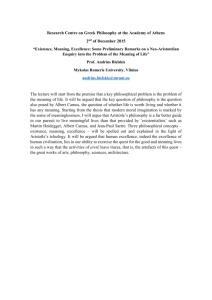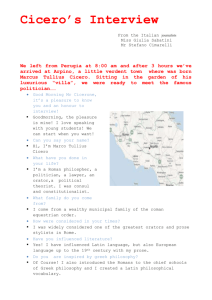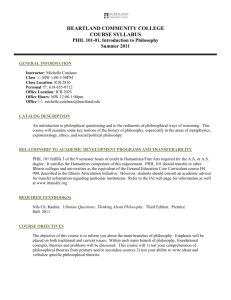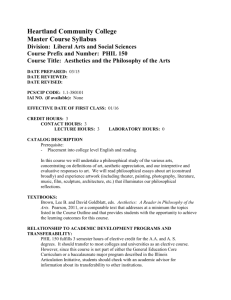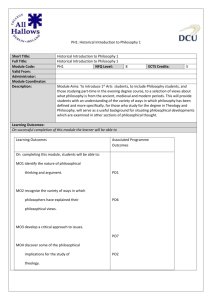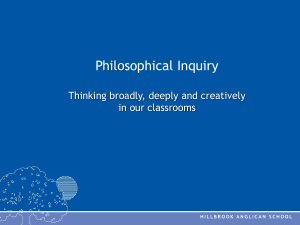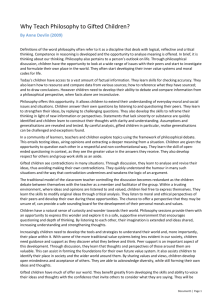HZT4U1 Course of Study
advertisement
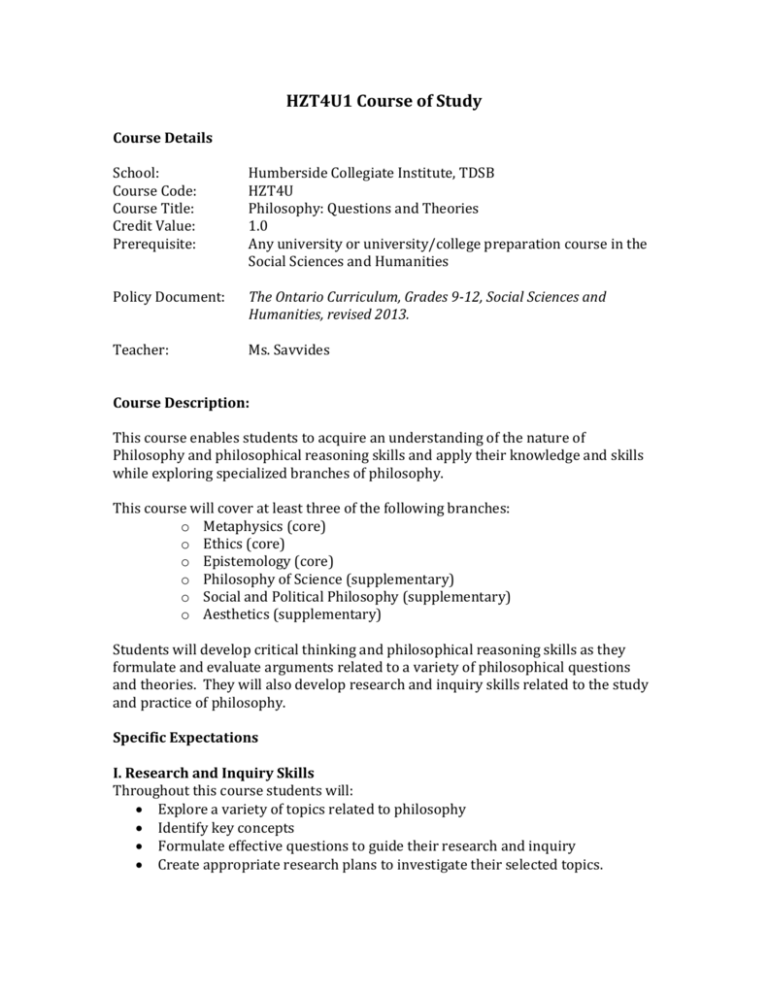
HZT4U1 Course of Study Course Details School: Course Code: Course Title: Credit Value: Prerequisite: Humberside Collegiate Institute, TDSB HZT4U Philosophy: Questions and Theories 1.0 Any university or university/college preparation course in the Social Sciences and Humanities Policy Document: The Ontario Curriculum, Grades 9-12, Social Sciences and Humanities, revised 2013. Teacher: Ms. Savvides Course Description: This course enables students to acquire an understanding of the nature of Philosophy and philosophical reasoning skills and apply their knowledge and skills while exploring specialized branches of philosophy. This course will cover at least three of the following branches: o Metaphysics (core) o Ethics (core) o Epistemology (core) o Philosophy of Science (supplementary) o Social and Political Philosophy (supplementary) o Aesthetics (supplementary) Students will develop critical thinking and philosophical reasoning skills as they formulate and evaluate arguments related to a variety of philosophical questions and theories. They will also develop research and inquiry skills related to the study and practice of philosophy. Specific Expectations I. Research and Inquiry Skills Throughout this course students will: Explore a variety of topics related to philosophy Identify key concepts Formulate effective questions to guide their research and inquiry Create appropriate research plans to investigate their selected topics. Locate and select information relevant to their investigation from a variety of primary sources Based on preliminary research, formulate arguments and anticipate counterarguments. Assess various aspects of information gathered from primary and secondary sources Record and organize key ideas and information using a variety of formats Correctly use terms relating to their chosen topics Use appropriate formats to communicate results of research and inquiry effectively for a specific purpose and audience Demonstrate an understanding of their inquiries and follow appropriate conventions for acknowledging sources (MLA, APA, Chicago, etc) Demonstrate an understanding of the general research process by reflecting on and evaluating their own research, inquiry, and communication skills. II. Philosophical Foundations Throughout this course students will: Explain the main areas of philosophy and identify some of the big questions that arise in each area. Describe the main periods of philosophical development and the major philosophers identified with those periods. Distinguish between philosophy and other areas in the social sciences and humanities. Demonstrate an understanding of the form and components of a philosophical argument, including a philosophical argument differs from other communications, and identify these components when formulating and evaluation arguments. Describe critical thinking skills and habits of mind that support philosophical reasoning, and demonstrate the ability to use them in various texts Correctly use terminology related to logic when formulating and analyzing arguments. Explain common fallacies of reasoning and identifying them when formulating and analyzing arguments. Explain how philosophical reasoning and critical thinking skills can be applied in everyday life, and demonstrate the ability to apply these skills in various contexts. III. Core and Supplementary Topic Expectations Demonstrate an understanding of the main questions in core and supplementary topics Summarize the positions of various major philosophers Explain different theories from core and supplementary topics with reference to some classic and contemporary texts Compare how different philosophers and/or schools of philosophy approach the same questions/issues. Evaluate the strengths and weaknesses of philosophical responses to some of the main questions in the core topics. Describe forces that have helped shape the evolution of major philosophical topics and thought over time, and analyze their impact. Demonstrate an understanding of the influence of philosophy and philosophical topics and ideas on other subject areas. Formulate and explain, using philosophical reasoning. Correctly use terminology related to the core topics of philosophy. Course Content: Introduction to Philosophy What is the study of Philosophy? How to write a short philosophical argument The Pre-Socratics Socratic Dialogue The Allegory of the Cave Theories of Human Nature Key Philosophers: Bertrand Russell Ayn Rand Socrates Plato Aristotle Thales of Miletus Parmenides Evaluation (s) Written Assignment Quiz Formal and Informal Logic The syllogism (categorical, disjunctive, hypothetical) Inductive and deductive reasoning Informal fallacies Key Philosophers Aristotle Evaluation (s) Written argument Murder Mystery Quiz Metaphysics –Ontology and Epistemology The mind body problem Personal identity Free will and determinism Computers and consciousness Does God exist? Key Philosophers: Thomas Hobbes John Locke Rene Descartes Baruch Spinoza Gilbert Ryle George Berkeley David Hume Immanuel Kant Plato Aristotle Evaluation (s) Written Essay: Short Argument Oral presentation Quiz Social and Political Philosophy Freedom and authority The individual and the state Anarchism, communism, socialism, liberalism, conservatism Theories of Justice The social contract Key Philosophers: Plato Thomas Hobbes Nicolo Machiavelli John Locke John Rawls Karl Marx Georg Hegel Emma Goldman Michael Bakunin Evaluation(s) Oral Presentation Written assignment Quiz Aesthetics What is art? What is the value of art? What is beauty? Studying Urban and Natural Landscapes-Field trip Key Philosophers: Plato Aristotle Leo Tolstoy Clive Bell Evaluation(s) Three part project: written review, written interview, presentation of art work Ethics Utilitarianism Categorical Imperative What constitutes the good life? Ethical Case studies Key Philosophers: Jeremy Bentham John Stuart Mill Immanuel Kant Aristotle Evaluation (s) Film study oral presentation Quiz Mark Breakdown Course Work: 70% Final Exam: 30% Achievement Chart Assignments and evaluations will be designed to reflect the categories outlined in the Achievement Chart. Students will be evaluated according to the following breakdown of categories: 30% - Knowledge/Understanding 30% - Thinking/Inquiry 20% - Communication 20% - Application Communication: Extra help is available upon student request. Students and parents can reach the teacher at the school. Phone: 416-393-8122 (20085)

